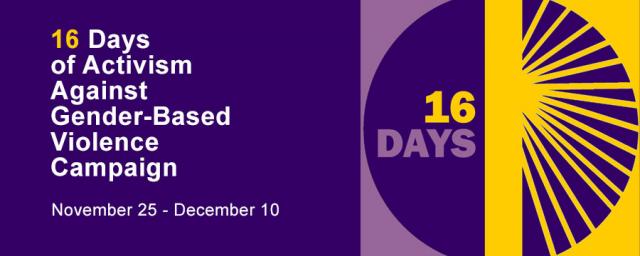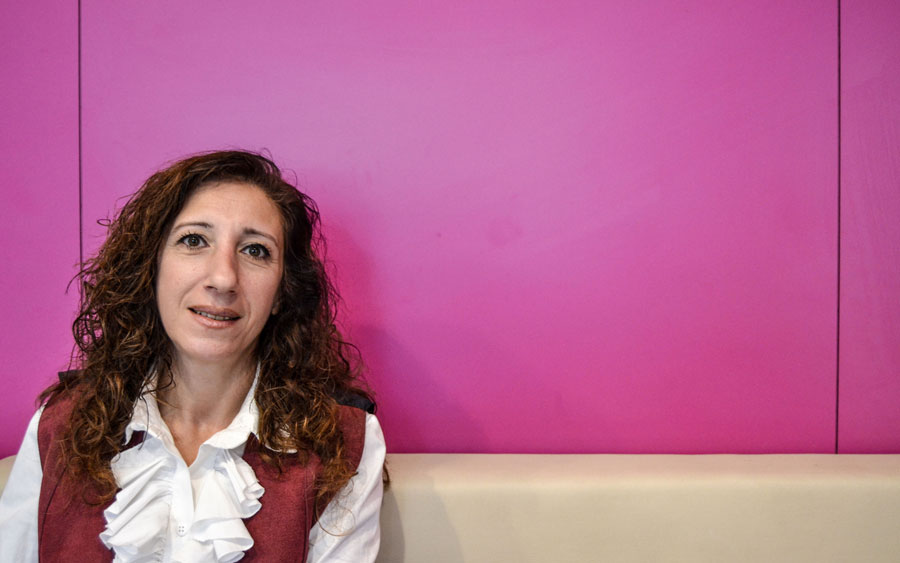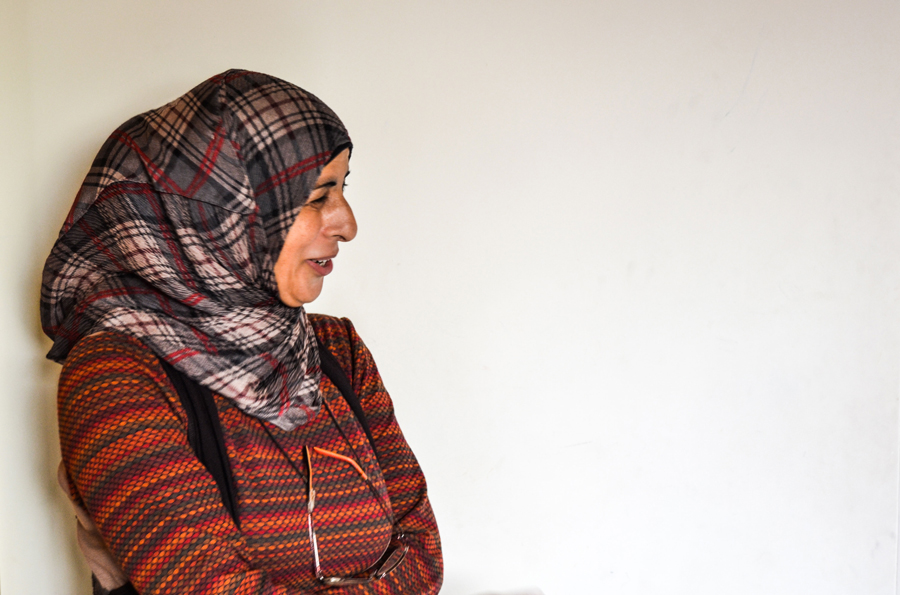
The 16 days of activism campaign is an international campaign that lasts for 16 days between November 25th - International Day for Elimination of Violence against Women, and December 10th - Human Rights day.
The campaign raises awareness about gender-based violence on local, national, and international levels.
Violence is not always physical. This year, Oxfam wants to focus on profiles of influential women who are working in their communities to raise awareness of the different forms of gender violence related to access to resources and opportunities.
The focus will be on Lebanon, where women are leading a wave of change on different fronts.
The Syrian refugee crisis is shifting gender roles and creating spaces for women in Lebanon to lead and play influential roles at home and in their communities.
Women’s committees in Palestinian gatherings are providing social services to women and organizing awareness sessions and workshops on environmental issues, public health, hygiene, gender equality – and gender based violence.
Our gender hub in Beirut is also funding projects in Lebanon and the region that help increase women’s legal literacy, and provide them with financial assistance to access legal services.
The women we spoke with told tales of transformation, empowerment, and breaking down barriers and social taboos, not only to make their voices heard, but to push others to challenge the status quo and speak up.
Zeinab

Zeinab’s background is in social research. But 26 years ago, she switched to teaching. Well, “not a ‘switch’,” as she argues. “They complement each other.”
Zeinab is one of eight women on the Women’s Committee in the gathering of Daouk. Since the year 2000, Oxfam’s local partner organization PARD has been setting up local women committees in Palestinian gatherings in South Lebanon and Beirut. There are currently 25 women committees that PARD supports. The committee in Daouk is a committee of eight women that put together workshops and sessions for other women living in the gathering, on whatever issues the participants want to learn more about. In coordination with local organizations, such as PARD, the women’s committee also provides social and psycho-social support to the women who need it.
“To make it work, you need an understanding of the local economy, the social fabric in the camp, and the inherited values, particularly on gender roles and domestic violence […] Our community is well-integrated, so has to be our approach.”
In parallel, Zeinab is going through her own internal development process. “I used to get very frustrated when I was unable to assist someone, especially as a leader of sorts in the community. People rely on you to deliver... But I am slowly learning to manage my expectations, and accept the limitations.”
“What next? I want to get out and establish the same Women’s Committees in all other Palestinian gatherings and camps and Syrian settlements in Lebanon.” But Zeinab admits there’s a long way to go before she can achieve that; 999 steps to be exact. “It’s a journey of a thousand steps, and I think I’ve just completed my first…”
Nada

"The abuse was never physical. But the bullying, the intimidation, the manipulation - it was just too much to handle after a while and I decided to leave... But I had no idea what to do or where to start."
Almost a year after leaving her husband, Nada is now preparing to become a Paralegal with Justice Without Frontiers (JWF), the same organization that is helping her through her legal battle to annul her marriage and gain custody of her children. "I'm a teacher by trade, so I love talking, and being around people, and feeling like I am providing others with valuable information."
JWF wants Nada to lead the awareness sessions and provide consultations to other women going through similar situations. "They think I can engage and inspire them, and this humbles me. [...] If you had told me one year ago that I was going to be leading sessions on legal awareness, I would've cringed and shied away. Now it seems like the natural next step. I can use my experience to better someone else's situation – Of course, I’m interested!"
Nabila

Nabila was a salon owner in the gathering outside the Shatila Palestinian camp in Lebanon. It was how she got to meet and know the women in her neighborhood. “You live here long enough, and people begin to trust you with the stories of their lives.”
Eight years ago, Nabila was asked to join the Women’s Committee in the Palestinian gathering of Daouk. The committee faced significant pushback at the beginning. “People thought we were crazy: a bunch of women talking about gender equality, gender based violence, or domestic abuse, at a time when most Palestinians in the camps and gatherings lacked access to basic services. […] We faced the same pushback when displaced Syrians started moving into the overcrowded camps and gatherings.”
But this is where Nabila’s personal relationships and knowledge of the context came in handy. “I always tailor my approach based on what I know about the person or family’s situation... If they trust me, they’ll let me in to their homes and their lives, and they’ll accept the information I’m providing.”
But the constrictions of life in the camps and gatherings can be as cultural and psychological as they are geographical. And this, according to Nabila, is one main challenge she faces. “People here live in silos and they are looking inwards, both literally and metaphorically. We show them what is happening outside their circles, we explain how it complements their lifestyles, and they slowly open up. It’s a long process, but it works, every time, and the results make it all worthwhile!”
Sara

What was a ten minute walk from Sara’s house in Syria to the hospital where she worked as a nurse, became a 6 hour ordeal to pass through the checkpoints that popped up when the war started. “The war changed our lives in unimaginable ways. The checkpoints split up the community and controlled our access to grocery stores, schools, and jobs... We became prisoners in our own homes and neighborhoods.”
When Sara’s husband lost his job, she became the sole breadwinner in the family. “But it was getting more difficult to make it to work on time, and eventually they started cutting my hours [...] I lost income because of it." When the situation deteriorated, Sara decided to use her annual leave to take time off from work and move her family to a rented house in a nearby town - “Just for a few weeks until things quieted down”.
Several displacements later, Sara is in Tyre, South Lebanon, and has not been home in more than three years.
Sara is currently volunteering as a nurse with local organizations in her community. She organizes awareness campaigns on hygiene, public health and vaccination for other displaced families from Syria.
Manal

Manal is planning a revolution. She currently works as a therapist focusing on gender based violence with PARD at El-Buss Palestinian gathering in Tyre, South Lebanon. She is stubborn and creative, which means she’s always looking for new ways to push forward the same messages.
“It’s easy to say we want to “empower” women, but how practical is it when they go back to their homes and communities where they are surrounded by the same destructive habits. […] We need to be careful not to push women from one form of violence to another if they 'speak up' or 'revolt' against injustice.”
That is why Manal thinks we need buy-in from “non-traditional” targets. “Women do not want to eliminate men, we want a partnership... And you need men and boys to believe in this cause to create a critical mass that will revolt against the tyranny of patriarchy.”
The assistance and psycho-social support provided by the Women’s Committee to women and families in the Daouk gathering (Beirut, Lebanon) are facilitated and coordinated by PARD, and funded by Oxfam in Lebanon.
The support Nada received from Justice Without Frontiers is part of the Women's Access to Justice programme that is managed by Oxfam's Gender Hub in Beirut, and funded by the Swedish International Development Agency (SIDA).
Zeina & Moufida

For Zeina & Moufida, the most prominent form of violence in their lives is the law that prohibits Lebanese women from passing their citizenship to their children.
They are both married to Palestinian men and their children can only be Palestinian on paper. But by Lebanese law, Palestinians cannot pursue post-secondary education, work in most professions, own a house, or even buy a car.
“We are always stressed,” says Zeina. “We can get evicted and lose everything at any point. I’m always arguing with my boys because they see no point in completing their school education. You can’t blame them!”
Moufida jumps in: “Rates of early marriage are high in Palestinian camps and gatherings - not because we don’t value our young women,” she says. “But what can we do when the political and legal systems in place invade our homes and prohibit us from accessing our most basic rights? This leaves us with very few options to subsist with dignity…
If this isn’t a form of domestic violence, I don’t know what is.”